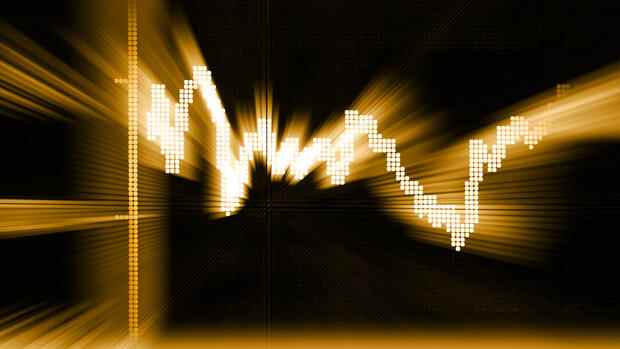Dusseldorf A late comeback brings trading on the German stock market to a conciliatory end the day after the long Easter break. The Dax finally closed on Tuesday with little change at 14,153 points.
The psychologically important mark of 14,000 points wobbled at times. With the daily low of 13,991 points, it was briefly undershot. It then went up again, and in the afternoon even stronger gains followed, which completely offset the initial losses.
Above all, automotive stocks were in demand. Shares in VW and Continental each gained more than three percent, as did Daimler Trucks.
The winner of the day in the Dax was Hellofresh’s paper with an increase of more than 3.7 percent. The shares of the corona vaccine pioneer Biontech, on the other hand, slipped almost ten percent in Xetra trading.
The current overall situation on the German stock market can be described as follows: After a climb of almost 2500 points from the beginning to the end of March with a short-term daily high of 14,925 points, the correction has been underway since the beginning of April. So far, this downward momentum since the beginning of the month has been significantly less pronounced than the upward momentum in March. This suggests that the Dax could soon start again towards 15,000 points.
Because despite the many uncertainties such as the upcoming interest rate hikes in the USA and the Ukraine war, the volatility index VDax has fallen well below the pre-war level. On the day of the Russian invasion at the end of February, the value rose to 36 percent and even reached 44 percent a few days later.
This stock market fear barometer is currently back at 26 percent. Such a low value means that futures market professionals do not expect large price fluctuations in the next 30 days. For classification: Values below 20 percent signal quiet stock market phases.
Investor sentiment also gives reason to hope for a renewed increase towards 15,000 points. According to the Dax-Sentiment survey of the Handelsblatt, most investors have now adjusted their portfolios to a certain extent to current developments. So the pressure to sell is low – but there is little interest in buying on the other side.
The simplified conclusion of this situation: Positive developments or the mere absence of further negative reports should ensure rising prices. Should the situation suddenly deteriorate, for example in the Ukraine war, there could be a sell-off. However, according to sentiment expert Stephan Heibel, who evaluates this weekly survey, such a sell-off is likely to be “short-lived”.
Government bond yields continue to rise
However, interest rates remain a major burden. On both sides of the Atlantic, ten-year government bond yields are approaching the major and psychologically particularly important marks. In Germany this is the threshold of one percent, in the USA it is the three percent mark. “We have reached a point where rising interest rates are putting the brakes on corporate profits and the economy,” says Thomas Altmann from the investment house QC Partners.
Apparently it is only a matter of time before these marks will be overcome. On Friday, the yield on a ten-year US Treasury bond was 2.6560 percent, on Tuesday the value reached 2.912 percent, its highest level since the end of 2018.
The yield on ten-year Bunds was also 0.961 percent on Tuesday, its highest level in almost seven years, after 0.766 percent on Thursday.
US Federal Reserve Banker James Bullard has again called for US interest rates to be raised to 3.5 percent by the end of the year in order to curb high inflation. But you can’t get there in one step, and the hikes shouldn’t be more than 0.5 percentage points per step, said the president of the St. Louis branch of the Fed on Monday evening.
However, the market is not expecting such high interest rates by the end of the year. The majority of professionals on the Chicago futures exchange CBOE expects an interest rate of between 2.5 and 2.75 percent by the end of the year. 3.5 percent are considered unlikely.
Look at individual values
Bayer: CEO Werner Baumann warns of drug shortages. “If there were new interruptions in the supply chains, the production of medicines could also come under pressure,” he told the “Bild”. The stock fell 1.1 percent.
Today, Tuesday, the shares Airbus and Beiersdorf are traded with a dividend discount. At Airbus, a dividend of 1.28 euros is paid, the closing price on Thursday was 106 euros. Beiersdorf pays a dividend of EUR 0.70 at a closing price of EUR 94.44 last Thursday.
Merck: In addition to Biontech, other corona profiteers also went downhill significantly. Stocks from the laboratory equipment supplier Sartorius (minus 2.4 percent) and Merck KGaA (minus 3.8 percent) were among the Dax tail lights.
Here you can go to the page with the Dax course, here you can find the current tops & flops in the Dax.
